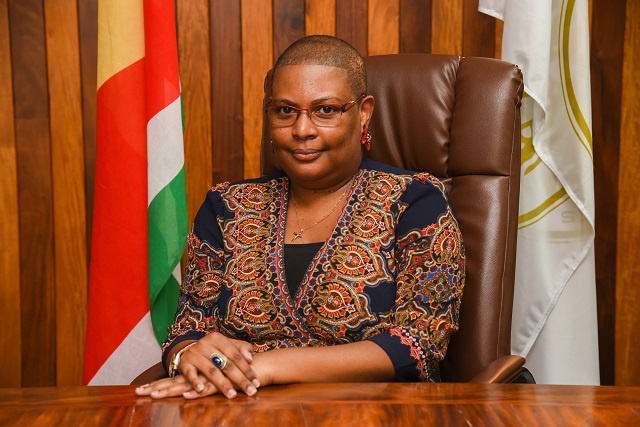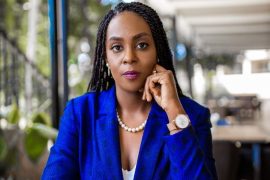Ms. Caroline Abel was first appointed Governor of the Central Bank of Seychelles (CBS) on 14th March 2012, becoming the first woman in Seychelles to hold the position. She was re-appointed to serve a second six-year term in March 2018. She is also Chairperson of the CBS Board.
As Governor, she also represents Seychelles as the Alternate Governor for the International Monetary Fund, World Bank, and the African Development Bank, as well as Governor for the African Export-Import Bank. She is also Vice-Chairperson of the African Financial Inclusion Policy Initiative (AfPI), a position she assumed in August 2020, serving a two-year term.
Ms. Abel holds a BA in Economics, with Distinction from the University of Leeds and a Masters in Philosophy (MPhil) in Monetary Economics and Finance graduating with Distinction from the University of Glasgow.
In this E-interview with African Leadership Magazine, Ms. Abel talks about her achievement as Governor of the bank of Seychelles and also bared her thoughts on gender issues in leadership.
Excerpts;
Question 1: On 14 March 2012, you became the first woman to be appointed Governor of the Central Bank of Seychelles; succeeding Mr. Pierre Laporte. What has been your major drive in attaining this prestigious position?
Being the head of a central bank is a notable feat for anyone attaining or aspiring to be in that position. When deciding my career path, I first considered joining the medical field as a nurse. Back then, I would never have imagined that I would end up working in the financial sector, let alone become Governor of the Central Bank of Seychelles.
I was instilled with the values of working hard from a young age. Upon joining the Central Bank, I approached my work with the same determination, spirit of understanding and collaboration that I apply to everything I decide to do as a matter of principle. We are fortunate in Seychelles that we have no institutionalised gender barriers. Girls and boys have equal access to education and are free to aspire to become whomever they want to be. Therefore, I would say that having the first female Governor of the Central Bank was only a matter of time, as appointment to the post is based on competency and ability to steer the country’s economy. Having said that, I am proud to be serving in this position, and I hope that it motivates other women to move out of their comfort zone and not be afraid to challenge themselves in whatever career they aspire to join.
Question 2: As the first Runner-up in the female business leader of the year category, what achievements do you acknowledge about yourself that made you attain this position?
When thinking about the COVID-19 pandemic, many of us mostly see the challenges and disruptions it has brought to how we usually do things. We need to keep in mind that changes often come through upheavals; when challenged, we are urged to think out of the box and do things differently and more efficiently.
I decided to look at the obstacles brought about by the pandemic through the opportunity lens, which has allowed me to lead my team to:
- Design innovative policies to ensure the continued functioning of the financial system and provide support to the
- Work on adopting a Digital Financial Agenda guiding the implementation of the Modernisation Plan of the National
- Payment System and adopting a National Fintech Strategy was accelerated in the wake of the pandemic.
- The Central Bank also seized the opportunity to intensify its financial education initiatives, which we hope will increase the uptake of digital financial services.
- For nearly a decade, you have served as the Governor of the Central Bank of Seychelles, excelling in a field that is highly dominated by males. What are some obstacles you may have come across and how did you overcome them?
I believe that what matters most to me in my role of Governor is not the gender but rather the ability to approach your duties with zeal and confidence. The challenges that I have faced have indeed been more than what my predecessors had to deal with, and I am sure that the challenges awaiting my successor will be more complex than what I have faced, as such is the evolving nature of the financial sector. Like we have seen recently with the pandemic, challenges are neither kinder nor harsher to women leaders. Economic and financial circumstances do not change depending on who sits in the Governor’s chair, and decisions that need to be made are the same, regardless of if the Governor is male or female. As long as the individual is willing to work hard, they should overcome any challenges.
- What would be your word of encouragement to other young African female leaders anticipating holding such high positions in their respective countries?
To other young African female leaders, I would say, do not allow your gender to become a barrier to your aspirations. As recent as a few decades ago, tradition and culture had women primarily pigeon-holed in nurturing or support roles. Today, however, women are making their marks in domains previously mainly attributed to men. Work should not bear a gender-specific stamp. As long as an individual is willing to put in effort and dedication, they should be able to reach the highest echelons in any chosen field.
If you are going to focus on your gender, place emphasis on qualities such as adaptability, tenacity, determination, support and flexibility – some traits that I believe to be inherent to the female gender – and use these qualities to make you an asset to your organisation. The rest should fall into place.
- As the Governor of the Central Bank of Seychelles, do you have any plans with Africa’s
striving financial sector?
Being connected to Africa and the rest of the world, particularly with regards to the financial sector, is of utmost importance to Seychelles, being a small island state, dependent on tourism and cross-border trade.
The Central Bank of Seychelles is represented on or participates actively in initiatives driven by several key institutions and groupings working to strengthen the development and growth of Africa’s financial sector and African economies. This includes the African Development Bank, African Export-Import Bank, the Committee of Central Bank Governors from the SADC region, and the African Financial Inclusion Policy Initiative, which is part of the broader Alliance of Financial Inclusion network, among others.
The continent has a lot of potential for the financial sector’s role in facilitating activities, including trade, that will strengthen economic development. As Governor, I am particularly focused on ensuring that the Central Bank collaborates with its counterparts across the continent and the stakeholder organisations to continue finding ways to address challenges hindering more progress.
We cannot overlook the need to ensure convenient, affordable, reliable and safe financial services – at the core of which is the provision and access to innovative and digital financial services and products. Equally important is the need to have financial inclusion and education strategies. Our policies should also ensure that as individual countries and as a continent, we have robust regulatory and supervisory frameworks to deter and mitigate the various risks that have not ceased to threaten global financial stability in recent years. This includes cyberthreats, terrorist financing and money laundering, among others.
- How have you managed the perceptions and stereotypes in a financial sector which is largely dominated by males?
While generally worldwide, the financial sector is dominated by males – even at the level of Governors, where there are currently only 14 women heading central banks across the globe – the perception of gender inequality and stereotyping should not be generalised. If I may draw on the Seychelles example, many women are working in the financial services sector. Going further, while central banking has traditionally been male-dominated, the Central Bank of Seychelles has a 65 percent female workforce, a 50/50 representation of both genders at Management level and 37 percent representation of women at Board Director level.
The statistics point towards a larger percentage of males when it comes to more senior positions and rather than simply attributing this fact to the sector being male-dominated, we should consider the possible factors that are hindering women to join the higher ranks. As such, I firmly believe that both men and women should be given the support and opportunity to develop and reach their full potential when it comes to their careers, including making it to leadership roles.
- Seychelles is a small island and a major tourism centre. How does the Central Bank drive investments and finances in Seychelles tourism, And what does this mean for the Island?
The primary objective of the Central Bank of Seychelles is to promote domestic price stability, which assists economic growth and helps maintain investor confidence in the economy. The institution supports domestic economic activity and reduces financial stability risks through the
effective implementation of Monetary Policy.
The CBS is also a forward-looking institution that does not shy away from taking bold and unconventional measures. This has been particularly true since the onset of the COVID-19 pandemic that has severely impacted the country’s mainstay – the tourism industry – and in this process, the entire economy. Last year, the Board of the Central Bank approved two credit line facilities being administered by various credit-granting institutions, to assist private sector businesses impacted by the pandemic. Through the schemes, impacted businesses in the tourism and other sectors have been able to access funding to meet their critical operating expenditures and make necessary improvements driven by the impact of the ongoing pandemic, such as introducing new technologies.
Although the recovery path remains uncertain, the various policy measures implemented by the Central Bank and the Government have contributed to support the domestic economy and safeguard financial stability. This has contributed to a gradual pick-up in tourism activity and the resumption of economic activity, with encouraging signs being observed albeit the performance has not reverted to pre-COVID-19 levels.
- Being in the capacity of financing Seychelles’ tourism sector and the major financial provider for Seychelles’ economy, how has the COVID 19 Pandemic affected the economic reforms in Seychelles?
Following the 2008 global financial crisis and Seychelles defaulting on its sovereign debt, the country embarked on an economic reform programme supported by the International Monetary Fund (IMF). Much success had been achieved, where the country was seeing strong economic growth and on track to reduce the public debt-to-GDP ratio to 50% by 2021.
Given the severe impact of COVID-19 globally, local authorities had to implement policies to support the livelihoods of individuals and businesses and prevent the economy from collapsing. To implement some of the measures meant incurring more debt for the Government, which led to the debt-to-GDP ratio increasing to just above 100 percent in 2020.
Faced with this reality, the country has now embarked on a new economic reform programme with the support of the IMF, where reducing the Government’s budget deficit and improving the country’s debt sustainability level are among the key objectives. As with any reform, there will be challenges to overcome, but if well-implemented – and if the country stays on track to achieve the set targets – the reforms will bring the country on the path of recovery and in an even better position than it was before the pandemic.
Concluding Statement
The past months have been somewhat challenging but also present us with a learning curve that allows us to grow on a personal as well as on a professional level. The unprecedented pandemic has shown the world that all economies are vulnerable, and we need to be ready to take bold and decisive actions to maintain economic stability. Post the pandemic, we all need to take stock – be it at a personal, organizational and country-level – of our actions and what we can do differently to prepare ourselves better to face any future eventualities. We must remain resilient when adversity strikes, as it is in these testing times that we should take the opportunity to grow and achieve our full potential. I am honoured to emerge as the runner-up for the Governor of the Year Award, which would not have been possible without the support and dedication of my team at the Central Bank of Seychelles.
THANK YOU





Comments are closed.